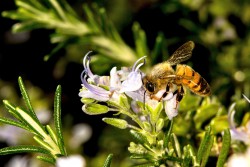 Researchers from Arizona State University’s (ASU) School of Life Sciences recently discovered that the commonly accepted claim that blames nutritional deprivation for the increasing collapse of honey bee colonies is incorrect. The two studies published by ASU researchers found that the stress of short-term nutritional deprivation as larvae actually makes honey bees more resilient to starvation as adults. The findings were published this week in two papers in The Journal of Experimental Biology.
Researchers from Arizona State University’s (ASU) School of Life Sciences recently discovered that the commonly accepted claim that blames nutritional deprivation for the increasing collapse of honey bee colonies is incorrect. The two studies published by ASU researchers found that the stress of short-term nutritional deprivation as larvae actually makes honey bees more resilient to starvation as adults. The findings were published this week in two papers in The Journal of Experimental Biology.
“Surprisingly, we found that short-term starvation in the larval stage makes adult honey bees more adaptive to adult starvation. This suggests that they have an anticipatory mechanism like solitary organisms do,” said Ying Wang, assistant research professor with the school and lead author of the two investigations. Wang said they found evidence of this mechanism in several areas such as behavior, endocrine physiology, metabolism and gene regulation.
The anticipatory mechanism discussed in the studies, also called Predictive Adaptive Response, explains a possible correlation between prenatal nutritional stress and adult metabolic disorders such as obesity and diabetes. These findings show for the first time that social organisms can have this mechanism.
The studies also found that when bees experience starvation as larvae, they are able to reduce their metabolic rate, maintain their blood sugar levels, and use other fuels faster than the control bees during starvation, which increased the probability of their survival under a starvation situation.
Since bees are critical to the world’s food supply, learning how bees cope with stressors is critical to understanding honey bee health and performance. Managed honey bee colonies have declined worldwide, and the current global population has decreased to 2.5 million, compared to the global bee population of 5 million in the 1940s. This phenomenon comes at a time when the global demand for food is rising to meet the nutrition needs of 7.4 billion people.
Most existing research on bee nutrition has focused on using adult honey bees, rather than their young. This new information changes the current understanding of colony collapse disorder and provides new avenues to study.
